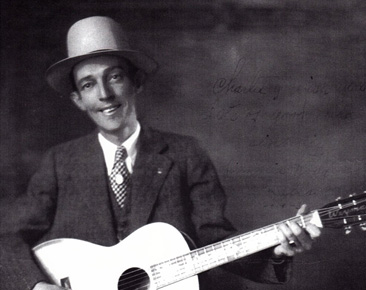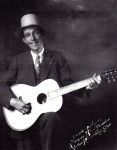
 This week we are going to remember the life and times of America’s Blue Yodeler, the Singing Brakeman, and the Father of Country Music: the late, great Jimmie Rodgers. On Saturday, May 26, Jimmie Rodgers will have been gone 79 years.
This week we are going to remember the life and times of America’s Blue Yodeler, the Singing Brakeman, and the Father of Country Music: the late, great Jimmie Rodgers. On Saturday, May 26, Jimmie Rodgers will have been gone 79 years.
Arguably the most significant man in American music, he has heavily influenced country, blues, folk, jazz, Hawaiian, rock, pop, Americana, western swing, and bluegrass music. To celebrate the life and times of Jimmie Rodgers, I will be highlighting a Jimmie Rodgers’ song each day this week, and showcasing popular bluegrass version/s of each song.
The Brakeman’s Blues — Jimmie Rodgers
Portland, Maine is just the same as sunny Tennessee
Portland, Maine is just the same as sunny Tennessee
Any old place I hang my hat is, home sweet home to me[Yodel] Hey, hey, hey
I went to the depot and I looked up on the board
Went to the depot and looked up on the board.
(Hello, Memphis.)
It said it’s good times here, but better on down the road[Yodel]
Eat my breakfast here, get my dinner in New Orleans
(Right on down to Birmingham.)
Get my breakfast here, get my dinner in New Orleans
I’m going to get me a momma, Lord, I ain’t never seen[Yodel]
Where was you, Momma, when the train left the shed?
Where was you, Momma, when the train left the shed?
Standin’ in my front door, wishin’ to God, I was dead[Yodel]
If your house catch a fire, there ain’t no one around
(Sing them blues, boy.)
If your house catch a fire, there ain’t no one around
Just put my trunk out the window, let the house burn on down[Yodel]
If that’s your momma, you’d better tie her to your side
If that’s your momma, you’d better tie her to your side
Cause if she flash my train, I’ll sure let her ride[Yodel]
The ultimate ramblin’ man song, The Brakeman’s Blues (also known as Yodelin’ My Blues Away) is a signature Jimmie Rodgers song. Jimmie was known as “The Singing Brakeman” because he was one.
Having worked on the railroads, he had a strong connection to these sorts of traveling songs. At this time, train work had a grip on the nation’s imagination. The ability to travel all across the country was a rare privilege in 1928, and railroad workers were always up to date on the latest news. They were well-respected throughout the working class.
The hard-working individual who lives on the road and has traveled across the country seems to never go out of style, as we have seen by the admiration of truck drivers over the past few decades. This title has stood the test of time and has stuck with Jimmie for over eighty years.
The Brakeman’s Blues gives a peek into the allure of this occupation.
Any old place I hang my hat is home sweet home to me.
This line applies to Jimmie Rodgers in more ways than one. In addition to working on the railroad, Jimmie would also “hobo” to find work. The term hobo is often misused in today’s culture. A hobo and a bum are NOT the same thing. Hobos were migrant workers who would use the trains to go across the country in order to find work.
Many well-respected individuals would use this method of travel. Rodgers himself would ride the rails to find work. He also would travel in order to live in better climates because of his health. As many of you know, Jimmie Rodgers died of tuberculosis, and had the disease for years. Due to the nature of this disease, certain atmospheres and humidities made it easier for Jimmie to breathe.
One aspect of this song that is purely Rodgers is his little asides. Rodgers transformed so many aspects in American music and introduced many subtle practices which may not seem like a huge deal, but are now common place in the music industry. This is just one example of something that Rodgers started. He was the first to include spoken phrases that are not directly connected to the song, such as the “Hey, hey, hey” with which many people are familiar. Rap artists use this all the time, and it all started with Jimmie Rodgers.
In addition to being the father of country music, Rodgers is a leading figure in blues music. Revered by many as the greatest blues singer of all time, Howlin’ Wolf’s favorite blues singer was Jimmie Rodgers.
“My man that I dug, that I really dug, that I got my yodel from, was Jimmie Rodgers. See, he yodeled, and I turned it into something more of a howl.”
Jimmie’s blues is evident in many of his songs, particularly in his collection of thirteen blue yodels. The blues sound is clearly evident in this song, due to the format of this song. Most classic blues songs follow the same pattern. The song’s are written with one line, the line repeated, and then a punch line. The punch line is key. In addition to adding a hint of humor, the punch line adds clarity to the preceding lines and expresses the true sentiment of the verse and the song itself.
A well-written blues song is timeless, which is why Jimmie’s songs are some of the most-recorded tunes of all time. Not just in country and bluegrass, Jimmie’s songs are recorded and performed all over the world.
Two of the most popular bluegrass versions of The Brakeman’s Blues are by two of the biggest names in our music: Bill Monroe and Chris Thile.
The Father of Bluegrass recorded many songs by the Father of Country Music. The Brakeman’s Blues is just one of these. One of the biggest changes Monroe introduced to the Rodgers version is the addition of more instrumentation. Although Rodgers was an innovator on blues guitar, his playing was still very primitive. The groundwork which his guitar playing laid was extremely important, but instrumentally it pales in comparison to Monroe’s version.
Monroe’s full band really kicked this tune up a notch. Because of the instrumental breaks, he dropped the last verse. By adding mandolin, banjo, fiddle, and bass, Monroe developed a fuller and more complex sound.
The mandolin and banjo breaks on this rendition are particularly impressive. A real bluesy, groovy banjo is hard to beat, and this song makes it very easy for one to shine. This tune also showcases Monroe’s bluesy mandolin. Between Arnold Schulz’s influence and Jimmie Rodgers’ songs, Monroe’s famous F-5 is about as bluesy as it can get. The chop of Monroe’s mandolin really gives this number a certain “bounce” to it. The fiddle intro to this is just icing on the cake.
Monroe’s singing style fits Rodgers’ songs perfectly as well. His tenor voice sounds so strong, and is really in the spotlight. His sky-high voice soars on the yodels! The power and range of Monroe’s vocals never ceases to impress.
On The Del McCoury Band’s latest album, Old Memories: The Songs of Bill Monroe, they do a very Monroe-esque version of the song. The older Del gets, the more like Monroe he sounds. He is the perfect choice as the singing voice of Monroe in the upcoming Bill Monroe biopic. His band sounds great on this track as well, and prove why they are the most awarded band in the industry. This is one of the best Monroe tribute tracks in honor of Bill’s 100th birthday last year.
Chris Thile’s version is a little different than Monroe’s. While it is one of the most traditional sounding songs in Thile’s repertoire, he still does it in his own way. The fervor and feeling with which he plays his mandolin is one reason he is an iconic figure in modern American music. He and his eventual Punch Brothers do a top notch job on this Rodgers classic on Thile’s transition album between Nickel Creek and The Punch Brothers, How To Grow A Woman From The Ground. The song provided him with a grassier-edge than he had done previously by implementing a more traditional bluegrass instrumentation. However, his Chris’ unique touch is not lost, and makes this rendition purely Thile. Chris Eldridge’s lead guitar playing also has room to shine on this cut, which is a real treat.
The Punch Brothers’ version of Brakeman’s Blues proves to traditionalists that they can perform traditional bluegrass as good as their progressive numbers. Personally, I would love to see The Punch Brothers record an entire album of traditional songs such as this one, just to prove the naysayers wrong.
Rodger’s influence is timeless in all American, and bluegrass is no different. Whether the Father of Bluegrass, Bill Monroe, or his modern day progressive equivalent, Chris Thile, Rodgers and his music will always be relevant.
Stay tuned for tomorrow’s Rodgers Rememberance Vol II: Any Old Time.







